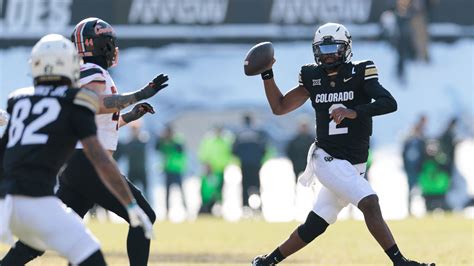
Shedeur Sanders, the highly touted quarterback for the Colorado Buffaloes, has been ticketed for speeding for the second time this year, raising concerns about his driving habits and potential implications for his image and the team. The incident occurred in Boulder County, Colorado, adding another mark to his driving record after a previous speeding violation earlier in the year.
Shedeur Sanders, the starting quarterback for the Colorado Buffaloes and son of head coach Deion Sanders, has once again found himself in the headlines for off-the-field issues, specifically a speeding violation in Boulder County, Colorado. This marks the second time this year that the young quarterback has been ticketed for speeding, raising concerns about his driving habits and potentially tarnishing his public image. The incident comes at a time when Sanders is under intense scrutiny as the leader of a high-profile college football program. While the specific details of the latest infraction remain limited, the repeated nature of these incidents is prompting discussion among fans, analysts, and the university administration. This incident not only brings into question Sanders’ personal conduct but also casts a shadow over the Colorado Buffaloes football program, which is already facing immense pressure to perform.
The recent speeding ticket adds to a series of events that have kept Sanders in the public eye, both for his athletic prowess and his off-the-field activities. As a prominent figure in college sports, his actions are closely monitored, and any missteps are quickly amplified by social media and traditional news outlets. The university and coaching staff will likely address the situation internally, emphasizing the importance of responsible behavior for all student-athletes, particularly those in leadership positions. The repeated nature of these infractions may lead to further consequences, potentially affecting Sanders’ standing within the team and his public perception. This incident serves as a reminder of the challenges faced by young athletes navigating the pressures of fame and the responsibilities that come with being a role model.
The implications of this incident extend beyond just Shedeur Sanders, impacting the Colorado Buffaloes football program and the university as a whole. The program, under the leadership of Deion Sanders, has garnered significant attention and investment, with high expectations for success. Incidents like these can distract from the team’s goals and create negative publicity, potentially affecting recruiting efforts and fan support. The university administration is likely to emphasize the importance of maintaining a positive image for all student-athletes, particularly those in high-profile positions. The situation underscores the challenges of managing the personal conduct of athletes in the age of social media and 24/7 news coverage, where every action is subject to public scrutiny.
The repeated nature of these incidents may prompt a broader discussion about the support systems in place for student-athletes and the resources available to help them navigate the pressures of fame and responsibility. Universities often provide counseling, mentorship programs, and educational resources to help athletes manage their personal lives and make responsible decisions. However, the effectiveness of these programs is often debated, and there is a growing recognition that more needs to be done to support the holistic development of student-athletes. This incident serves as a reminder of the need for ongoing dialogue and proactive measures to ensure that athletes are equipped to handle the challenges that come with their position.
The incident involving Shedeur Sanders is a microcosm of the larger issues facing college athletics, where the pressure to succeed on the field often overshadows the importance of personal development and responsible behavior. As the scrutiny on athletes continues to intensify, universities and coaching staffs must prioritize the well-being of their student-athletes and provide them with the support they need to make sound decisions both on and off the field. The repeated speeding violations by Shedeur Sanders serve as a cautionary tale, highlighting the potential consequences of failing to address these issues proactively. The university’s response to this situation will be closely watched, as it will set a precedent for how they handle similar incidents in the future.
Details of the Incident
While the exact details of the most recent speeding ticket remain scarce, the fact that it occurred in Boulder County, Colorado, indicates that it happened relatively close to the University of Colorado campus. The specific speed at which Sanders was allegedly traveling and the posted speed limit have not been publicly disclosed. Similarly, information regarding the type of vehicle he was driving and the time of day the incident occurred has not been released. The lack of detailed information has fueled speculation and debate among fans and media outlets. However, the fact that Sanders has been ticketed for speeding before suggests a pattern of behavior that needs to be addressed.
The previous speeding violation also occurred in Colorado, although the specific location and details of that incident are also not widely known. The repeated nature of these infractions raises questions about whether Sanders is taking the necessary precautions to ensure he is driving safely and legally. It also raises concerns about whether he is fully aware of the potential consequences of his actions, both for himself and for the university. The university’s athletic department likely has policies in place regarding the behavior of student-athletes, and it remains to be seen whether Sanders will face any disciplinary action as a result of these repeated violations.
The incident has also sparked a debate about the role of fame and privilege in the lives of young athletes. Sanders, as the son of a prominent coach and a highly touted football player, is accustomed to a certain level of attention and scrutiny. However, that does not excuse him from adhering to the same laws and standards of behavior as everyone else. The incident serves as a reminder that athletes, regardless of their status, are responsible for their actions and must be held accountable for their mistakes.
Impact on Shedeur Sanders’ Image
The repeated speeding violations have the potential to damage Shedeur Sanders’ public image, which is carefully cultivated through social media and endorsement deals. As a prominent figure in college sports, Sanders is seen as a role model for young fans, and his actions are closely scrutinized. Incidents like these can erode trust and undermine his credibility, potentially affecting his ability to secure future endorsements and sponsorships. The negative publicity generated by the speeding tickets can also distract from his performance on the field, as fans and media outlets focus on his off-the-field behavior rather than his athletic achievements.
Sanders’ social media presence, which is carefully managed and curated, is now under even greater scrutiny. Fans and critics alike are watching to see how he responds to the incident and whether he takes responsibility for his actions. A sincere apology and a commitment to changing his behavior could help to mitigate the damage to his image. However, any perceived lack of remorse or accountability could further exacerbate the situation. The incident serves as a reminder of the importance of maintaining a positive public image, particularly for athletes who rely on endorsements and sponsorships to supplement their income.
The incident also raises questions about the role of his father, Deion Sanders, in shaping his son’s behavior. Deion Sanders, a former NFL star and current head coach of the Colorado Buffaloes, has a strong reputation for discipline and accountability. However, the fact that his son has been ticketed for speeding twice this year suggests that he may need to take a more active role in ensuring that Shedeur is adhering to the rules and regulations. The father-son dynamic adds another layer of complexity to the situation, as Deion Sanders must balance his responsibilities as a coach with his duties as a parent.
Implications for the Colorado Buffaloes Football Program
The speeding violations by Shedeur Sanders have the potential to negatively impact the Colorado Buffaloes football program, which is already facing immense pressure to perform. The program, under the leadership of Deion Sanders, has garnered significant attention and investment, with high expectations for success. Incidents like these can distract from the team’s goals and create negative publicity, potentially affecting recruiting efforts and fan support. The university administration is likely to emphasize the importance of maintaining a positive image for all student-athletes, particularly those in high-profile positions.
The incident also raises questions about the culture of the football program and the standards of behavior that are expected of its players. Deion Sanders has emphasized the importance of discipline and accountability, but the repeated speeding violations suggest that these values may not be fully ingrained within the team. The coaching staff may need to take a more proactive role in educating players about the importance of responsible behavior and the potential consequences of their actions. The incident serves as a reminder that success on the field is not the only measure of a successful football program. The program’s reputation and the character of its players are also important factors to consider.
The university’s athletic department is likely to conduct an internal investigation into the incident to determine whether any further disciplinary action is warranted. The investigation will likely focus on whether Sanders violated any team rules or university policies. The findings of the investigation will be closely scrutinized by fans and media outlets, as they will provide insight into the university’s response to the situation. The university’s decision on how to handle the incident will set a precedent for how they address similar issues in the future.
Legal Consequences of Speeding
The legal consequences of speeding vary depending on the state and the severity of the infraction. In Colorado, speeding tickets can result in fines, points on a driver’s license, and potential increases in insurance rates. The number of points assessed for a speeding ticket depends on the speed at which the driver was traveling and the posted speed limit. Accumulating too many points on a driver’s license can result in suspension or revocation of driving privileges.
In addition to fines and points, drivers who are convicted of speeding may also be required to attend traffic school or complete other educational programs. Traffic school is designed to educate drivers about safe driving practices and the potential consequences of their actions. Completing traffic school can sometimes result in a reduction in the number of points assessed on a driver’s license or a dismissal of the speeding ticket.
The legal consequences of speeding can be particularly severe for drivers who are under the age of 21. In many states, drivers under the age of 21 face stricter penalties for traffic violations, including the potential for immediate license suspension. The legal consequences of speeding serve as a deterrent to encourage drivers to obey traffic laws and drive safely.
Preventing Speeding
Preventing speeding requires a combination of individual responsibility and effective law enforcement. Drivers can take several steps to reduce their risk of speeding, including:
- Being aware of the posted speed limits and adhering to them.
- Adjusting driving speed to account for weather conditions, traffic, and other factors.
- Avoiding distractions while driving, such as cell phones, food, and passengers.
- Planning trips in advance to allow for ample travel time and avoid the need to rush.
- Maintaining vehicles in good working order to ensure safe operation.
Law enforcement agencies play a crucial role in preventing speeding through traffic patrols, speed enforcement cameras, and public awareness campaigns. Traffic patrols help to deter speeding by increasing the likelihood that drivers will be caught and ticketed for violating traffic laws. Speed enforcement cameras can be used to monitor traffic speeds and automatically issue tickets to drivers who are exceeding the speed limit. Public awareness campaigns can educate drivers about the dangers of speeding and the importance of obeying traffic laws.
Technology also plays a role in preventing speeding. Many modern vehicles are equipped with speed limiters, which can be set to prevent the driver from exceeding a certain speed. Navigation apps can also provide real-time speed limit information and warn drivers when they are exceeding the speed limit. The combination of individual responsibility, effective law enforcement, and technological advancements can help to reduce speeding and make roads safer for everyone.
The Role of Athletes as Role Models
The role of athletes as role models is a complex and often debated topic. Athletes, particularly those who are highly visible and successful, are often seen as role models for young fans. Their actions, both on and off the field, are closely scrutinized and can have a significant impact on the behavior of others. However, athletes are also human beings who are prone to making mistakes. It is important to recognize that athletes are not perfect and that they should not be held to an impossibly high standard.
At the same time, athletes have a responsibility to be aware of the influence they have on others and to conduct themselves in a manner that is consistent with the values of sportsmanship, integrity, and respect. Athletes who engage in irresponsible or illegal behavior can damage their own reputations and undermine the positive image of their sport. It is important for athletes to understand the potential consequences of their actions and to make choices that reflect positively on themselves and their sport.
Universities and sports organizations also have a role to play in shaping the behavior of athletes. They can provide athletes with education and resources to help them make responsible decisions and navigate the pressures of fame and scrutiny. They can also establish clear codes of conduct and hold athletes accountable for their actions. The combination of individual responsibility, institutional support, and effective oversight can help to ensure that athletes are positive role models for young fans.
Conclusion
The repeated speeding violations by Shedeur Sanders serve as a reminder of the challenges faced by young athletes navigating the pressures of fame and the responsibilities that come with being a role model. The incident has the potential to damage Sanders’ public image, negatively impact the Colorado Buffaloes football program, and raise broader questions about the role of athletes in society. It is important for Sanders to take responsibility for his actions, learn from his mistakes, and commit to changing his behavior. The university and coaching staff must also take a proactive role in supporting Sanders and ensuring that he understands the importance of responsible behavior. The situation underscores the need for ongoing dialogue and proactive measures to ensure that athletes are equipped to handle the challenges that come with their position. The university’s response to this situation will be closely watched, as it will set a precedent for how they handle similar incidents in the future.
Frequently Asked Questions (FAQ)
-
What exactly happened with Shedeur Sanders and the speeding ticket?
Shedeur Sanders, the quarterback for the Colorado Buffaloes, received a speeding ticket in Boulder County, Colorado. This marks his second speeding violation this year, according to the source article. The specific details of the incident, such as the speed he was traveling and the posted speed limit, haven’t been publicly released, but the recurrence raises concerns.
-
What are the potential consequences for Shedeur Sanders regarding this speeding ticket?
The consequences can range from fines and points on his driver’s license to potential increases in his insurance rates. In Colorado, accumulating too many points can lead to license suspension or revocation. Furthermore, the repeated nature of the offense may lead to internal disciplinary action from the University of Colorado or the football program, and also affect his public image and endorsement opportunities.
-
How could this speeding ticket affect the Colorado Buffaloes football program?
The incident introduces negative publicity, which can distract from the team’s overall goals. It could also potentially impact recruiting efforts and fan support, as the program is under pressure to perform well. The university might emphasize maintaining a positive image for all student-athletes, particularly those in leadership positions.
-
Is Deion Sanders, Shedeur’s father and coach, involved in addressing this situation?
As both his father and coach, Deion Sanders likely plays a role in addressing the situation. He’s known for emphasizing discipline and accountability, so he may address this internally with his son and the team. The public will be watching to see how he balances his roles as a father and a coach in this situation.
-
What can universities do to help student-athletes avoid incidents like this?
Universities can provide resources like counseling, mentorship programs, and educational workshops focusing on responsible decision-making and navigating the pressures of fame. They should also have clear codes of conduct and hold athletes accountable for their actions to promote a culture of responsible behavior.









